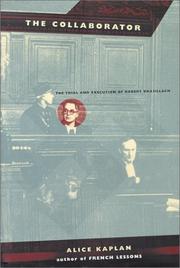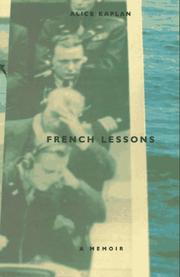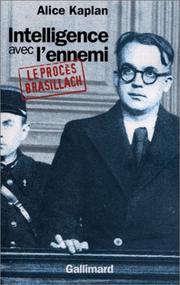| Listing 1 - 10 of 11 | << page >> |
Sort by
|

ISBN: 0226424146 9780226424149 0226424154 9780226424156 Year: 2000 Publisher: Chicago (Ill.): University of Chicago press
Abstract | Keywords | Export | Availability | Bookmark
 Loading...
Loading...Choose an application
- Reference Manager
- EndNote
- RefWorks (Direct export to RefWorks)
The author of the acclaimed memoir "French Lessons" tells the story of Robert Brasillach's rise and fall: his emergence as a golden boy of literary fascism during the 1930s, his wartime collaboration with the Nazis, his dramatic trial, and his afterlife as a martyr for French rightists and Holocaust revisionists.
Brasillach, Robert --- Authors, French --- -Fascism --- -Fascism and literature --- -Intellectuals --- -Trials (Treason) --- -World War, 1939-1945 --- -European War, 1939-1945 --- Second World War, 1939-1945 --- World War 2, 1939-1945 --- World War II, 1939-1945 --- World War Two, 1939-1945 --- WW II (World War, 1939-1945) --- WWII (World War, 1939-1945) --- History, Modern --- Treason --- Intelligentsia --- Persons --- Social classes --- Specialists --- Literature and fascism --- Literature --- Neo-fascism --- Authoritarianism --- Collectivism --- Corporate state --- National socialism --- Synarchism --- Totalitarianism --- French authors --- History --- -Political activity --- Collaborationists --- -Brasillach, Robert --- -Political and social views --- -History --- Fascism and literature --- Fascism --- Intellectuals --- Trials (Treason) --- World War, 1939-1945 --- Political activity --- Brasillach, Robert, --- Chénier, Robert, --- Political and social views. --- France --- Intellectual life --- Political and social views --- 20th century --- Authors [French ] --- Biography --- Brasillach, Robert, - 1909-1945 - Political and social views. --- Trials (Treason) - France - History. --- World War, 1939-1945 - Collaborationists - France --- Fascism and literature - France - History - 20th century --- Intellectuals - Political activity - France --- Authors, French - 20th century - Biography --- Trials (Treason) - France --- Fascism - France --- Brasillach, Robert, - 1909-1945 - Political and social views --- France - Intellectual life - 20th century --- History. --- Brasillach, Robert, - 1909-1945
Book
ISBN: 0816614946 0816614954 0816682402 Year: 1986 Volume: v. 36 Publisher: Minneapolis, Minn. University of Minnesota Press
Abstract | Keywords | Export | Availability | Bookmark
 Loading...
Loading...Choose an application
- Reference Manager
- EndNote
- RefWorks (Direct export to RefWorks)
Reproductions of Banality was first published in 1986. Minnesota Archive Editions uses digital technology to make long-unavailable books once again accessible, and are published unaltered from the original University of Minnesota Press editions.An established fascist state has never existed in France, and after World War II there was a tendency to blame the Nazi Occupation for the presence of fascists within the country. Yet the memory of fascism within their ranks still haunts French intellectuals, and questions about a French version of fascist ideology have returned to the political forefront again and again in the years since the war. In Reproductions of Banality, Alice Yaegar Kaplan investigates the development of fascist ideology as it was manifested in the culture of prewar and Occupied France. Precisely because it existed only in a "gathering" or formative stage, and never achieved the power that brings with it a bureaucratic state apparatus, French fascism never lost its utopian, communal elements, or its consequent aesthetic appeal. Kaplan weighs this fascist aesthetic and its puzzling power of attraction by looking closely at its material remains: the narratives, slogans, newspapers, and film criticism produced by a group of writers who worked in Paris in the 1930s and early 1940s - their "most real moment."These writers include Pierre Drieu la Rochelle, Louis-Ferdinand Celine, Lucien Rebatat, Robert Brasillach, and Maurice Bardeche, as well as two precursors of French fascism, Georges Sorel and the Italian futurist F.T. Marinetti, who made of the airplane an industrial carrier of sexual fantasies and a prime mover in the transit from futurism to fascism. Kaplan's work is grounded in the major Marxist and psychoanalytic theories of fascism and in concepts of banality and mechanical reproduction that draw upon Walter Benjamin. Emphasizing the role played by the new technologies of sight and sound, she is able to suggest the nature of the long-repressed cultural and political climate that produced French fascism, and to show-by implication - that the mass marketing of ideology in democratic states bears a family resemblance to the fascist mode of an earlier time.
Fascism --- -French literature --- -Neo-fascism --- Authoritarianism --- Collectivism --- Corporate state --- National socialism --- Synarchism --- Totalitarianism --- History --- History and criticism --- France --- Intellectual life --- -Fascism --- French literature --- History. --- History and criticism. --- -History --- Pʻŭrangsŭ --- Frankrig --- Francja --- Frant︠s︡ii︠a︡ --- Prantsusmaa --- Francia (Republic) --- Tsarfat --- Tsorfat --- Franḳraykh --- Frankreich --- Fa-kuo --- Faguo --- Франция --- French Republic --- République française --- Peurancih --- Frankryk --- Franse Republiek --- Francland --- Frencisc Cynewīse --- فرنسا --- Faransā --- Franza --- Republica Franzesa --- Gallia (Republic) --- Hyãsia --- Phransiya --- Fransa --- Fransa Respublikası --- Franse --- Францыя --- Frantsyi︠a︡ --- Французская Рэспубліка --- Frantsuzskai︠a︡ Rėspublika --- Parancis --- Pransya --- Franis --- Francuska --- Republika Francuska --- Bro-C'hall --- Френска република --- Frenska republika --- França --- República Francesa --- Pransiya --- Republikang Pranses --- Γαλλία --- Gallia --- Γαλλική Δημοκρατία --- Gallikē Dēmokratia --- فرانسه --- Farānsah --- צרפת --- רפובליקה הצרפתית --- Republiḳah ha-Tsarfatit --- פראנקרייך --- 法国 --- 法蘭西共和國 --- Falanxi Gongheguo --- フランス --- Furansu --- フランス共和国 --- Furansu Kyōwakoku --- Francija --- Ranska --- Frankrike --- Neo-fascism --- Thematology --- anno 1900-1999
Book
ISBN: 2070301141 Year: 2002 Volume: 3908 Publisher: Paris : Gallimard,
Abstract | Keywords | Export | Availability | Bookmark
 Loading...
Loading...Choose an application
- Reference Manager
- EndNote
- RefWorks (Direct export to RefWorks)

ISBN: 0226424197 9780226424194 0226421899 9780226421896 Year: 1994 Publisher: Chicago : University of Chicago Press,
Abstract | Keywords | Export | Availability | Bookmark
 Loading...
Loading...Choose an application
- Reference Manager
- EndNote
- RefWorks (Direct export to RefWorks)
Français (langue) --- French philology --- French philology --- French teachers --- French teachers. --- Professeurs de français --- United States. --- Universities --- Étude et enseignement --- Study and teaching --- Study and teaching. --- Biographies. --- Teaching. --- Kaplan, Alice Yaeger. --- Kaplan, Alice. --- Kaplan, Alice Yaeger. --- Kaplan, Alice Yaeger. --- United States.
Book
Year: 1987 Publisher: Charente
Abstract | Keywords | Export | Availability | Bookmark
 Loading...
Loading...Choose an application
- Reference Manager
- EndNote
- RefWorks (Direct export to RefWorks)
Book
Year: 1987 Publisher: Tusson : Du Lérot,
Abstract | Keywords | Export | Availability | Bookmark
 Loading...
Loading...Choose an application
- Reference Manager
- EndNote
- RefWorks (Direct export to RefWorks)
Antisemitism --- Antisémitisme --- Céline, Louis-Ferdinand, --- Sources.

ISBN: 2070759091 9782070759095 Year: 2001 Publisher: Paris Gallimard
Abstract | Keywords | Export | Availability | Bookmark
 Loading...
Loading...Choose an application
- Reference Manager
- EndNote
- RefWorks (Direct export to RefWorks)
Brasillach, Robert --- Trials (Treason) --- World War, 1939-1945 --- Procès (Trahison) --- 2ème guerre mondiale --- Collaborationists --- Collaborateurs --- Brasillach, Robert, --- Guerre mondiale, 1939-1945 --- Fascisme et litterature --- Fascisme --- Proces (Trahison) --- Intellectuels --- Ecrivains francais --- Histoire --- France --- Activite politique --- Procès (Trahison) --- 2ème guerre mondiale --- Ecrivains français --- Guerre mondiale, 1939-1945 - Collaborateurs - France --- Fascisme et litterature - France - Histoire - 20e siecle --- Fascisme - France - Histoire --- Proces (Trahison) - France - Histoire --- Intellectuels - France - Activite politique --- Ecrivains français - 20e siècle - Biographies
Book
ISBN: 0300040474 9780300040470 Year: 1987 Volume: 73 Publisher: New Haven (Conn.) : Yale university press,
Abstract | Keywords | Export | Availability | Bookmark
 Loading...
Loading...Choose an application
- Reference Manager
- EndNote
- RefWorks (Direct export to RefWorks)
French literature --- Mass society --- Littérature française --- Société de masse --- History and criticism --- Social aspects --- Histoire et critique --- Aspect social --- France --- Intellectual life --- Vie intellectuelle --- Littérature française --- Société de masse --- Mass society. --- Social life and customs --- Civilization --- Social aspects. --- Politique et littérature --- Idéologie et littérature --- 1945-1990 --- Civilisation
Book
ISBN: 9780674073784 0674073789 9780674072589 0674072588 0674416759 9780674416758 0674073800 Year: 2013 Publisher: Cambridge, Massachusetts
Abstract | Keywords | Export | Availability | Bookmark
 Loading...
Loading...Choose an application
- Reference Manager
- EndNote
- RefWorks (Direct export to RefWorks)
Algeria --- al-Dzāyīr --- al-Jazāʼir --- Algérie --- Algerien --- Algeriet --- Alg'eryah --- Algieria --- Algierska Republika Ludowo-Demokratyczna --- Alg'iryah --- Alzhir --- Alžir --- Argelia --- Cezayir --- Democratic and Popular Republic of Algeria --- Democratic Republic of Algeria --- Dżumhurija al-Dżazajrija asz-Szaabija ad-Dimukratija --- Gouvernement général de l'Algérie --- Jumhūrīyah al-Jazāʼirīyah al-Dīmuqrāṭīyah wa-al-Shaʻbīyah --- Jumhūrīyah al Jazāʼirīyah ash Shaʻbīyah --- People's Democratic Republic of Algeria --- République algérienne démocratique et populaire --- אלג'יריה --- الجزائر --- الدزاير --- Алжир --- Algeria (Provisional Government, 1958-1962) --- Politics and government --- Social conditions --- History
Book
ISBN: 2072993709 9782072993701 Year: 2023 Publisher: Paris: Gallimard,
Abstract | Keywords | Export | Availability | Bookmark
 Loading...
Loading...Choose an application
- Reference Manager
- EndNote
- RefWorks (Direct export to RefWorks)
Camus voulait exprimer dans La Peste (1947) les horreurs de la Seconde Guerre mondiale. Mais, pour tous ceux qui ont découvert le roman à l'époque de la pandémie de Covid-19, cette allégorie a pris un tout autre sens, et d'autres aspects ont acquis une importance capitale : la sensibilité de Camus face à la maladie et à la séparation, son expérience d'un mal contagieux, la psychologie et la politique d'une ville en quarantaine. Écrit sous forme d'un dialogue, dans le temps suspendu d'un confinement mis à profit pour relire, analyser et retraduire La Peste, cet essai offre un passionnant aller-retour entre passé et présent, États-Unis, France et Algérie. Au-delà d'une analyse indispensable du roman de Camus, Alice Kaplan et Laura Marris nous rappellent les fonctions essentielles de la littérature : explication, consolation, transfiguration.
| Listing 1 - 10 of 11 | << page >> |
Sort by
|

 Search
Search Feedback
Feedback About UniCat
About UniCat  Help
Help News
News